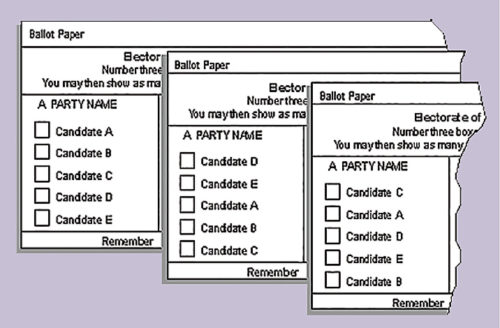“Ignore the political parties and take voting power into your own hands,” says political columnist MICHAEL MOORE.
ONE advantage of the Hare-Clark electoral system is that it puts the power squarely in the hands of the voter. In this column I explain how to use it most effectively and why.

The election is being held on Saturday, October 17 with early polling starting on Monday, September 28.
The single most important message is to avoid putting any number against someone you do not wish to elect. You might not like the person or you might disagree with the individual’s policy and approach. Perhaps the candidate is an elected member who, in your opinion, has done very little. Another possibility is that the candidate has behaved badly.
You have the power to choose one candidate or more from one party or more and leave the others unmarked. There is nothing wrong with just picking the best people for the job, even if your numbering of candidates runs right across independent and party lines.
The most effective way to cast a vote is to follow the Electoral Commission instruction on the ballot paper.
It reads: “Remember, number at least five boxes from 1-5 in the order of your choice”. Numbering further than 1-5 increases your chances of ensuring your vote is not “exhausted”.
“Exhausted” means that your vote does not support any candidate to get elected.
Preferential voting is the Australian standard and gives you flexibility with your vote. It allows you to put a number 1 or 2 or more against candidates who have little chance of being elected and then go on to support others who you believe are much more likely to be elected. This is an effective way to send a message to those with whom you are not happy.

With Hare-Clark, the parties have no say regarding the order their candidates appear on your ballot paper. Our system rotates the candidate names so your ballot paper will likely be different to another person’s.
Therefore, voters who simply number 1-5 down the list of major party candidates will be voting for a different number 1 candidate. This means the “donkey vote” (or running down the list) ensures the votes are evenly distributed amongst the party’s candidates.
When you choose more carefully, your vote will mean that candidate has an advantage over others that have been evenly distributed. This is also why a high-profile candidate, or one attractive to a particular group of people, has an advantage.
You, the voter, have the power to advantage a candidate who deserves support. Similarly, where a candidate is left unmarked by you and others, that person drops back, making them less likely to be elected.
Some argue that it is only necessary to put one mark on the paper, despite the instruction from the Electoral Commission. The reason for this is that the legislation has a specific clause to ensure where voter intention is clear, then the vote is recognised. Voters putting fewer than five numbers on their ballot paper have a much greater chance of having the vote “exhausted”.
It is not necessary to stick to one party. The power of voting under Hare-Clark is that you can place a number 1 against an independent, numbers 2 and 3 against minor parties, number 4 against a favoured candidate in one of the major parties and number 5 against a favoured candidate in the other party. The reason for doing this sort of voting is simply to get the best person for the job.
As an illustration, it makes sense for someone who is financially conservative but socially liberal to vote for a candidate they know personally in the Progressives column, followed by a Greens candidate before moving to support a right faction candidate in the Labor column and then on to the Liberal Party to vote for a candidate who is a “small L Liberal” rather than a conservative.
You exercise more power by supporting better candidates and refusing support to others who have not performed well, or are unlikely to perform well. Current members of the Assembly may be punished or rewarded for their performance – irrespective of party loyalty.
Your first vote may have been assigned to a little known candidate and originally be in the smallest pile of papers for the count. Your vote is not wasted. This pile of ballot papers is picked up by the counting staff and placed on other piles in accordance with the specific numbering of each ballot paper. The counting staff then move to the next smallest pile, which is distributed in the same way. This process continues until your ballot paper lands on someone who gets enough votes to be elected.
You have the power. Use it!
Who can be trusted?
In a world of spin and confusion, there’s never been a more important time to support independent journalism in Canberra.
If you trust our work online and want to enforce the power of independent voices, I invite you to make a small contribution.
Every dollar of support is invested back into our journalism to help keep citynews.com.au strong and free.
Thank you,
Ian Meikle, editor





Leave a Reply